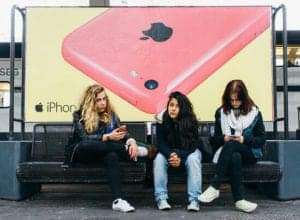It’s been accepted by most that social media has ruined our ability to have normal social interactions. A new study from the University of Missouri says the opposite – social media actually has no effect on our social interactions.
The study was broken down into two separate studies; one was conducted over a long period of time, while another was conducted over a short period of time. Michael Kearney, assistant professor at the University of Missouri’s School of Journalism, said the study refutes the notorious reputation of social media.

“The current assumption is that when people spend more time on apps like Facebook and Snapchat, the quality of their in-person social interactions decreases,” Kearney said in a press release. “However, our results suggested that social media doesn’t have a strong impact on future social interactions.”
The long-term study used data from the Longitudinal Study of American Youth, a national sample of 2,774 individuals over a three year period. The study looked at the associations between social media adoption in 2009 and social media use in 2011 to determine whether the frequency of direct contact was affected and how it changed the participants’ sense of social well-being.
It was predicted that social media adoption in 2009 would lead to decreased direct contact in 2011. While the first prediction wasn’t proven, the study positively predicted that an increase in social media use between 2009 and 2011 would lead to an increase of a sense of social well-being.
The short-term study involved 116 participants from the community, including undergraduate students. The participants reported about their social interactions as well as their passive social media usage, such as online chatting, over a period of five days, five times a day.
Related: These Are the Best and Worst Social Media Apps for Mental Health
Social media use wasn’t related to social interactions, the study said. Passive social media use was connected to a lower sense of social well-being, but only when the participants were alone.
“People who use social media alone likely aren’t getting their face-to-face social needs met,” Kearney said. “So if they’re not having their social needs met in their life outside of social media, it makes sense that looking at social media might make them feel even lonelier.”
Neither of the two studies suggested a hypothesis of social displacement, though, the study said. Kearney said the amount of time spent browsing apps such as Facebook could be substituted with actual face-to-face interactions.
“People are spending increased amounts of time using the internet and other media that may replace the time they could use for speaking face to face, but that doesn’t mean that they are worse for it,” he said. “People must ultimately be responsible for maintaining their relationships, whether that’s through social media or other means.”
Tori Linville is a freelance writer and editor from Clarksville, Tennessee. When she isn’t writing or teaching, she’s faithfully watching her alma mater, the University of Alabama, dominate the football field.


![How To: ‘Fix’ Crepey Skin [Watch]](https://cdn.vitalupdates.com/wp-content/uploads/2017/05/bhmdad.png)












